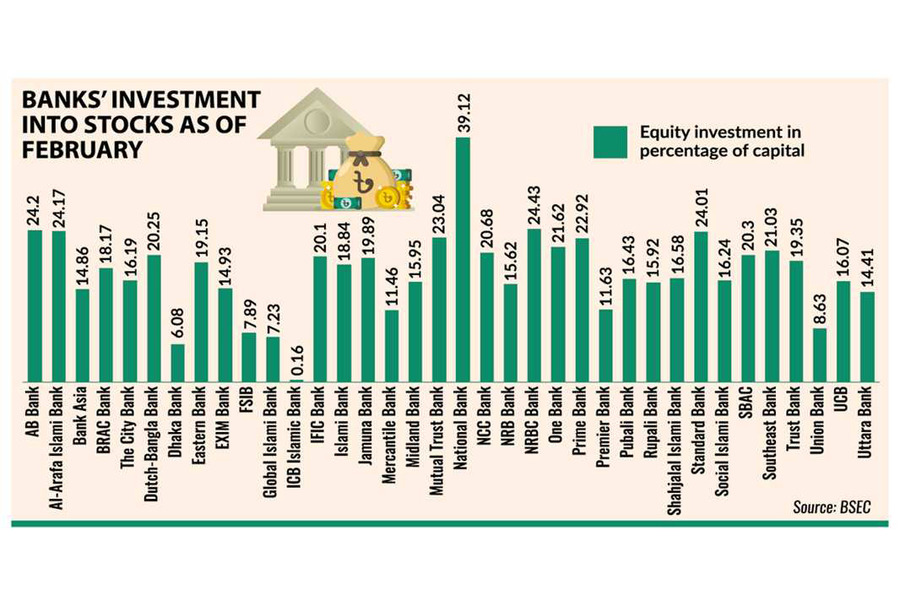
Published :
Updated :

A majority of listed banks have refrained from making fresh investments in the equity market even if they have not yet exhausted the permissible exposure limit because of pessimism surrounding stocks.
The banks, which have already invested substantial amounts of funds, have incurred huge losses due to the persistent erosion in the equity market.
Subsequently, they had to keep provisions from operating profits against the losses and the provisioning requirements continued to rise with the losses.
As many as 24 out of 36 listed banks have investments up to 15 per cent of their capital in the secondary market, within the allowable limit of 25 per cent, as of February this year. Because of the fear of further erosion of the market value of assets, banks would rather like to withdraw funds.
Meanwhile, stockbrokers and merchant banks have been given an extended period until December this year for keeping provision against unrealised losses but banks are required to keep 100 per cent provisions against losses.
Earlier, banks had enjoyed a waiver from provisioning against unrealised losses in investments in mutual funds. In May last year, the central bank scrapped the waiver.
Hence, the banks are to keep provision against unrealized losses in equity investments.
On one side, they are unable to make any profit from equity investments while on the other the provisioning requirement squeezes their profits. Ultimately, their lending operation and dividend distribution are affected because of the money stuck in the secondary market.
Asked whether there is any intention to make fresh investments, the chief financial officer of a private commercial bank having an investment worth above Tk 3 billion in equities said they would face provisioning shortfall because of a decline in operating profit in January-March (Q1) this year.
Syed Mizanur Rahman, acting managing director of AB Bank, said the company had already incurred huge losses in equity investments.
"There is no factor that inspires us to make further investments," he said.
The broad index of the Dhaka bourse fell 16.49 per cent or by 1,030 points in a year through December last year. The market also saw no IPO (initial public offering) since June last year.
Techo Drugs floated the latest IPO that closed subscription in June 2024.
In the meantime, not only foreign investors but also local institutional investors became inactive in the secondary market. The blue chip stocks have also failed to attract investors.
"In this situation, it's tough for the banks to think about fresh investments into equities with public money," Mr Rahman said.
Moreover, owing to lucrative interest rates of Treasury bonds, banks are leaning towards fixed-income securities.
The recent financial statements of banks point to a significant increase in investments in such instruments in the last two years. In return, they secured handsome profits.
Mohammad Akram Hossain, company secretary of Premier Bank, said banks had invested into securities expecting capital gains and dividends.
While there is persistent erosion of prices of listed securities, dividends declined significantly too in the last few years.
"The banks are neither making capital gains nor are they receiving good dividend income," Mr Hossain said.
As per a circular of the central bank, a bank is allowed to invest up to 25 per cent of its capital comprising paid-up capital, statutory reserve and retained earnings. A bank's consolidated investment can be up to 50 per cent of its capital.
According to the Bangladesh Securities and Exchange Commission, 11 out of 36 listed banks, including AB Bank, Al-Arafa Islami Bank, Dutch-Bangla Bank, and Mutual Trust Bank have investments equivalent to more than 20 per cent of their capital.
The trouble-hit National Bank Ltd. (NBL) has crossed the limit because of a reduction in its capital. Its exposure to the stock market is 39.12 per cent.
The company's Chief Financial Officer (CFO) Krishna Kamal Ghose said NBL's capital had been reduced by 50 per cent in the last one year as it did not have any retained earnings.
"We have no plan to make fresh investments into equities as we have laid importance on recovering loans," the CFO said.
NBL's non-performing loans rose 8 per cent in the one year through December last year to 60 per cent.
Similarly, many other banks are facing a high level of default loans that led to a liquidity shortage. Against the backdrop, banks would not consider diverting funds to risky investments.
However, banks still have scope of making investments in the secondary market from a special fund worth Tk 2 billion for each of them, introduced by the central bank after the outbreak of Covid pandemic in 2020. They need not keep provision against investments under the scheme.
But overall sentiment is against fresh injection of funds in equities for market erosion and provisioning requirements.
mufazzal.fe@gmail.com


 For all latest news, follow The Financial Express Google News channel.
For all latest news, follow The Financial Express Google News channel.